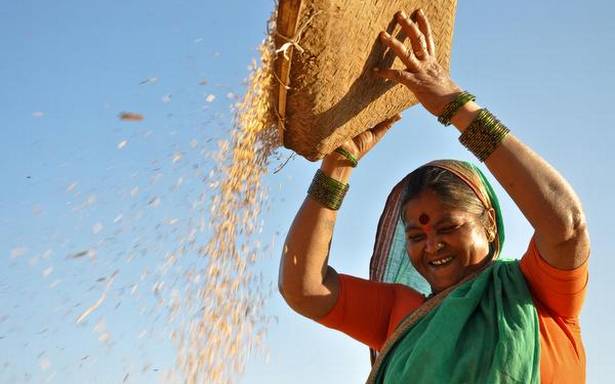Not so long ago, Dalit women farmers in Telangana used to face hunger and deprivation. Today, they have contributed foodgrains for pandemic relief. Farmers on the Tamil Nadu-Karnataka border have been sending organic produce to Bengaluru even during the lockdown. And Adivasi villages in central India are using community funds to take care of migrant workers who have returned home.
These inspiring stories show the potential of empowered rural communities to cope with crisis. And they expose the tragedy of a path of ‘development’ and governance that has not recognised or, worse, taken away the extraordinary agency of ordinary villagers to manage their lives.
Take Chandramma, who grows 40 varieties of crops, chemical free, on her rainfed plot in Bidakanne village in the Medak district of Telangana. “I have enough food to last through the lockdown and beyond,” she says during a Vikalp Varta webinar. Chandramma and thousands of Dalit farmers like her contributed 20,000 kg of foodgrains to Medak district’s COVID-19 relief measures. And they provide 1,000 glasses of nutritious millet porridge daily to health, municipality and police workers in Zaheerabad town nearby.
They are part of the Deccan Development Society, whose women’s sanghas are active in 75 villages in Telengana, and have helped thousands of women from a casteist, patriarchal society to revive dry land, millet-centred farming and thus gain control over land, seeds, water and knowledge. Having achieved anna swaraj (food sovereignty) and self-sufficiency, the women are now feeding others.

A member of the Deccan Development Society in her millet field
| Photo Credit:
Mohd Arif
Enough and more
Further south, a self-help group in Gumalapuram village of Tamil Nadu’s Dharmapuri district sends fresh organic produce to Bengaluru, 50 km away. A community-supported farming initiative started in 2017 with help from Navadarshanam, an organisation that promotes ecologically sustainable living, the SHG helps local organic farmers plan and put together a weekly box of vegetables, fruits and groceries for urban customers. Their revenues have increased 10-20 times and the strategy has helped them circumvent the problem millions of their counterparts faced during the lockdown: distress sales at low prices.
These are just some of the stories emerging from villages across India, where communities that have mobilised themselves are showing just how well they can cope with and overcome a crisis like the unprecedented one brought on by the pandemic and lockdown. Does the Prime Minister know about these stories when he suddenly begins to stress on the need for self-reliance? If he does, he ignores them, for his government pursues MoUs with foreign companies, dilutes laws protecting labour and environmental rights, puts

